- Home
- Sean Platt
[Alien Invasion 01.0] Invasion Page 16
[Alien Invasion 01.0] Invasion Read online
Page 16
Now she lay with her head in his lap, his reassuring fingers stroking her hair as if she were a pet. Just another child for him to shepherd, another mouth to feed.
She must have fallen asleep, because by the time Piper looked up again, she saw a dark pall behind Meyer’s head, the cut of his strong jawline above.
She straightened.
“Where are we?” she asked.
“Outside Des Moines.”
She looked around. By their new definitions, being “outside” a city meant a horizon at least. She was reminded of her earlier solipsistic thoughts and considered asking Meyer how he could be sure Des Moines was even still there. But it was a silly thought by a silly, frightened little girl. She let it go.
“What time is it?”
He apparently didn’t know, because he looked at the dash before answering.
“Almost eight.”
“From Chicago. Is that good time?”
Meyer shrugged. He was fourteen years older than her, but no less used to GPS and the Internet. They could unfold the map and see if it looked like good time, but it hardly mattered. They were where they were, and they had to go where they needed to go.
She looked through the windshield, feeling the car slow around her. A gas station was ahead, in the middle of a dark crossroads spotted only by a few yellowish streetlights. There were houses in the distance, but they were mute, with only scant illumination in the windows. She looked back at the kids to gauge the vehicle’s mood (or to assure herself that there were still people in the world, seeing as she couldn’t count on more than fifty miles of America), and found Lila looking uneasy. She was about to ask what was troubling her, but Meyer nodded at the station and spoke first.
“I want to stop here. It looks automated, so the pumps might still be unlocked.”
“Do we need gas?”
“We always kind of need gas. Maybe they’ll have cans.”
Maybe. But they’d passed a few stations along the way so far, always on these quiet back roads where it seemed that only horses and buggies truly belonged (not really, of course, but Piper had grown used to the hurly burly of a city), and this was the first in a while that still seemed operational. Just one more thing for Piper to worry about. Had the other stations been down because the attendants had shuttered them up before running home to hide? Or had the grid finally failed? But even the dead stations had been devoid of gas cans, just as they’d been stripped of food and water. There wasn’t much out here in the boonies, and the locals seemed to have divvied it up well before the city mice showed up.
“Sure,” Piper said. But she wasn’t sure at all. That creeping feeling of luck running thin was like a splinter in her spine. She wouldn’t say anything to Meyer because he’d only laugh, but Piper felt it just the same. They’d taken this trip on Meyer’s hunches and foreknowledge, but still she felt her own wasn’t worth saying. She was being chicken. Immature. A fool, with her head in the clouds.
But Meyer was studying her. The roads had been plenty clear for autodrive using the banked (but apparently undisplayable) maps, and he only took over manually when he wanted to stop. So far, he’d just told it to slow. He’d take the wheel soon, but for now he still had his eyes free. And you couldn’t hide much from Meyer Dempsey’s careful gaze when he decided to look.
“What is it?”
“Nothing.”
“Piper.” More earnest, more firm. “Tell me what’s bothering you.”
She laughed, and the sound was too loud. She should have left the radio on. They should be able to get Des Moines by now, and probably had been able to for a while. If it was still there, of course.
“I’m just a little freaked out. I know it’s ridiculous.”
He gave her a small, bittersweet smile. “It’s not ridiculous to be freaked out right now. Not even a little.”
“I’m sorry.”
“Don’t be sorry.”
That was sensible advice, but Piper kept thinking of all she didn’t know.
Were the ships closer to Earth?
Had they sped up or slowed down?
Had they annihilated Shanghai?
Was the president promising a quick response or urging a nationwide evacuation?
Strictly speaking, they should have kept the radio on at all times, scanning for new information. But they could only take so much, even when the signal was strong.
She reached for the radio, but Meyer held up a hand to stop her.
“I want to be able to listen,” he said.
“Why?”
“It just …” He looked like he’d said too much. His eyes flicked to the kids as he turned the Cruiser to manual and settled his foot on the pedal. “It pays to know what’s going on around you.”
Piper looked at the approaching gas station. She was suddenly very, very sure that stopping was an awful idea. They were in the middle of nowhere. The station was deserted, but that wasn’t necessarily a good thing. There wouldn’t be witnesses if something went wrong.
“You don’t really want to stop,” she said, watching him.
“We have to. We’re down to a third of a tank, and this is the first station we’ve seen with lights on. Probably all computerized. Might be our last chance for gas.”
They were coming closer. The parking lot was empty, the pumps lit but quiet. There was nothing wrong with the place, and yet something seemed off just the same. Something Piper could feel rather than see.
“Let’s keep going. A third of a tank? That’s plenty.”
He looked over.
“Let’s wait until it’s light.”
His look turned almost pitying. It was exactly what she’d been afraid of — both for his reaction and her worry. Was it the dark that bothered her? Why not stand on a chair and squeal for the big, strong man to save her? Piper hated herself a little, but couldn’t ignore the press of fear.
“We can’t drive until light.”
“Then let’s stop and rest.”
He shook his head. “We drive through the night.”
“Meyer …”
He gave her arm a pat. Piper wanted to shake the gesture away, insulted. The pumps were closer. The Cruiser was slowing. He stopped it short of the drive, paused in the middle of the street.
“We don’t know if we’ll find another station, Piper. Not one with working pumps, and I don’t really want to break into a Walmart for a generator and a sump pump. You heard about the blackouts.”
Piper said nothing. No, she hadn’t heard that; he must have turned on the radio while she’d been sleeping.
“Look,” he said. “I figure it’s somewhere between another seven, eight hundred miles. We might be able to get that far on a tank if we don’t stop and start a lot and if I let it autodrive. Look, there in the window: insurance.”
She looked and saw several big red plastic gas tanks just inside the station, a row of five-gallon cans.
“We fill the gas tank. We fill two or three of those and carry them with us.”
“In the back seat?” said Trevor. “They’ll stink!”
Meyer ignored him and continued talking to Piper. “That might be enough, and we won’t have to stop again.” He flashed a smile. “Besides — I have to go to the bathroom.”
“Me too,” said Lila. Piper had noticed that Lila had to go a lot recently. Maybe she had a nervous bladder. Maybe she was developing diabetes.
“You can pee at the side of the road,” Piper said.
Meyer put his hand on Piper’s arm, then steered the car forward again with one hand on the wheel. The thing wouldn’t stop on auto without the GPS, but Meyer actually liked to drive. Probably because he liked the control.
“We need new maps anyway,” he told her.
Piper felt her heart flutter, then pushed the feeling down. She tried on a smile, knowing she was being stupid, and managed to hold it until the engine was off and Meyer had entered the unlocked store to retrieve the gas cans.
He realized the tanks were
empty a moment before the locals arrived.
CHAPTER 26
Day Four, Evening
Rural Iowa
Trevor was reminded of The Children of the Corn.
He’d never seen the movie nor read the story, but his father had told him the basic storyline the same as he’d given him the gist of the other classics he suspected modern kids were too cool to know. There were just some things that were part of culture, Trevor’s father seemed to think — references that had become vernacular even to those who didn’t know their source. Things like “using the Force,” “entering the Matrix,” or (and this one was particularly apt), “Beam me up, Scotty.”
All Trevor knew about The Children of the Corn was that it was somehow about farmlands and cults. Old gods and sacrifice. But most of all, creepy country people who surrounded outsiders like zombies.
They’d come out of houses. Out from behind the gas station. From a leaning shack that might have been a post office or another government building. They were in the middle of the streets.
Men. Women. Even — and yes, there was that old cinematic reference again — children.
It was dark. Trevor tried to remind himself that he wasn’t used to such darkness, having been raised in New York City. He wasn’t used to quiet or the sough of the wind through wheat and corn. He wasn’t used to the peculiar subaural echo that lived between buildings in the open air when nobody was speaking and no engines were running. It was a kind of hum, too low to be heard and more there to be felt — or sensed.
To Trevor, fifteen years old and unused to the country, simply being here was creepy no matter what happened. There might be nothing wrong. Nothing unusual. No reason to fear.
But clearly, his father felt something was amiss as well. Trevor could see it in the way he carefully racked the pump, now finished swearing over its spitting and gurgles. He’d seen it in Piper before they’d stopped, and in the way she hadn’t even wanted to stop in the first place.
It wasn’t just Trevor. Something was wrong.
“Hi there,” said Meyer, nodding toward the man in the lead as he approached from the front. He seemed to be trying hard not to look around. This was all very normal. Just a welcoming party of two dozen people who’d chosen to slowly approach from all sides at once.
This is how we say hello ‘round these parts. Jest have a sit, and we’ll talk about the crops and the weather.
The man was wearing a green hat with a brim entirely too stiff for something so filthy and battered. He nodded and gave it a tug.
“Howdy,” he said.
“Looks like your station is out of gas.” Meyer tried to affect a laugh, but the sound came out hollow. Several eyes moved to Piper, Trevor, Lila, and Raj. More hollow laughs abounded in the quiet darkness.
“Ayuh, we noticed the same.” The man stopped walking. Now they were in a rough circle around the Land Cruiser, maybe thirty paces out. The feeling of being in a creepy movie he’d never seen reasserted itself on Trevor, and he felt his pulse quicken.
“I’m Meyer Dempsey, and this is my family. Piper, Trevor, Lila, and her boyfriend, Raj.” He looked back, his voice too even to be natural. “Say hi, everyone.”
Muttered hellos.
“Hey, I know you,” said a woman behind the man. “You’re that movie guy.”
The man beside her — slightly rotund, balding, with three days’ stubble — cocked his head. To the woman, he said, “He’s in movies?”
“No, he’s a movie maker. I seen him on the web before. And on TV, too.”
“That right, friend?” said the man with the green cap. He was probably in his late forties with slightly saggy jowls and tired eyes, like an old hound dog’s. “You in Hollywood?”
“His wife’s that comedian,” said the woman. “Heather Hawthorne.” She looked pleased at having remembered.
“I know her,” said the man. “She does that filthy show. About panties or whatnot.”
Trevor felt himself tense. The man didn’t sound approving. Trevor didn’t want to stereotype, but it seemed that Midwestern values may have trumped his mother’s rather outrageous West Coast comedy routine. He’d only been allowed to see his mother’s act this past year, and even then the most colorful bits had been censored. He’d had to watch the rest online, off a pirate site.
“I heard she’s with that other comedian,” said the woman. “It was in People.”
This seemed to be the final word. The woman seemed to be waiting for Meyer to elaborate, and the others were following her lead. Trevor found himself inching back to touch the Land Cruiser’s cool security. He didn’t like this at all.
They’re just making conversation about your mom and dad and the tabloids. And Sam Blackwell, whom they love to rub in Dad’s face. No big deal. Just having a chat. At night. In the middle of the street. Surrounding us in a circle, slack-jawed and vacant, like the people of the corn.
“We’re not together anymore,” Meyer said.
The woman nodded. She looked at the fat man. “See? Toldja.” She looked at Meyer. “I knew a couple got a divorce once.”
Meyer didn’t seem to know what to say to that. So he stepped away from the pump and put his hand on the door handle. “Well. We’ll just be on our way, then.”
“Why don’tcha stay a bit?” said the man. The others were silent, standing and waiting. One woman held a baby, but even the baby was still — or, Trevor thought darkly, dead. “No rush to head out.”
Meyer forced a new smile. “We have to be going.”
He opened the door.
The man moved forward again, causing the others to do the same. The circle tightened, now just twenty or fifteen paces out. He held up a hand.
“Now, hang on a bit. You just picked up them gas cans from the station, and I know the payments aren’t working inside. How were you planning on paying?”
“Oh, I …”
“Maybe you can pay with your gas.”
“That’s what I was planning. But there’s no gas, so I can’t pay for the cans when I pay for the gas, so …”
“Ayuh,” the man repeated. “Gas ran out last night. Whole huge caravan of people came through in a line from the west, but no refill truck. Whole pack of cars, one after another.”
“Out-of-towners,” said a new woman. “People like you.”
“Funny thing is,” green cap continued, “few of us wanted to head out to see family and whatnot, and few of us did, just this morning, early, before light. But you know what they did before they went, those people who headed away?”
Meyer looked around, assessing. Green cap stepped forward again.
“Took the gas right outta our cars. Overnight. Took hoses and sucked it out in the dark. Like thieves.”
Meyer gritted his teeth in a humorless grin. “That’s a shame.”
“Sure is,” said the woman who’d recognized him. “Seeing as this is the only station around.”
“So I was wondering,” said the man with the hat. “Maybe I can borrow your car to head up the road.”
Meyer looked at Piper. “Maybe I could run out for you.” Trevor wondered if his father was serious. Meyer Dempsey was many things, and sometimes generous was one. But he didn’t think this was one of those times. They had to hurry. Everyone in the world had to hurry, and there wasn’t enough room or time for them to all have their way.
“Maybe I could do it,” said the man, now holding his hand out. “If’n you’ll just give me the keychain there.”
“I’d rather not.”
Mumbles of protest.
“Tell me,” said the man. “Why is it that all those people should be able to come through and suck our station dry and leave us stuck here, and you won’t help us?”
“Your problem is with the people who siphoned your tanks. Not with me.”
“We’re just as stranded, mister.” The man nodded toward the Land Cruiser. “And I’d bet you still have enough gas left in there to be worth taking, should a man be sufficiently motiv
ated.”
“One of you must have a gas can. Something your people missed. There must be one gas can in a shed. Something for a tractor or a log splitter.”
“Tractors,” said the fat man. “Yep, we must know nothing but tractors, being poor country folk.”
“We don’t have any quarrel with you.” Meyer was now half in the cabin. Through the open door, Trevor saw him reaching into the cab, his hand searching without looking.
“Maybe we have a quarrel with you,” said the man.
“We’re going to go now.”
“And bring us back some gas, right?” said the man in the cap.
“He ain’t coming back,” said the woman.
“I’ll bring you gas.” Trevor could hear the lie in his father’s voice.
“Maybe,” said green hat, “we want the whole car, and whatever else you might got inside.”
Meyer found what he was looking for. He whipped his hand out and waved the pistol.
The man wasn’t a zombie after all, it seemed. His hands went up, and he fell a step back. But others were eyeing him, waiting at the flanks. They only slunk back after Meyer waved the gun at them, too.
“You’re making a mistake, friend,” said the man. “End times are coming, and you’re apt to be on the wrong side.”
Meyer tossed his head at Trevor and the others: the universal gesture for Get the fuck in the car right now, before we get butt-raped. Then he slid into the Cruiser’s front seat, now pointing the pistol through the open window.
“I’ll tell Jesus you said hi the second I can get cell reception,” he told the man.
Meyer fired the engine and sped away, not seeming to care if the people in the circle jumped out of the way or if he ran them into the dust.
CHAPTER 27
Day Four, Evening
Western Iowa
“Where are we?” Piper asked.

 Jumper: Books 1-6: Complete Saga
Jumper: Books 1-6: Complete Saga WhiteSpace Season One (Episodes 1-6)
WhiteSpace Season One (Episodes 1-6) Tomorrow's Gone Season 1
Tomorrow's Gone Season 1 Yesterday's Gone: Episode 1
Yesterday's Gone: Episode 1 Yesterday's Gone: Seasons 1-6 Complete Saga
Yesterday's Gone: Seasons 1-6 Complete Saga The Beam- The Complete Series
The Beam- The Complete Series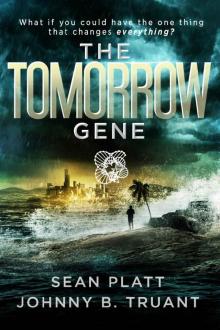 The Tomorrow Gene
The Tomorrow Gene Karma Police: Karma Police Book Two
Karma Police: Karma Police Book Two The Fall (Karma Police Book 5)
The Fall (Karma Police Book 5) The Beam: Season Three
The Beam: Season Three Resurrection
Resurrection No Escape (No Justice Book 2)
No Escape (No Justice Book 2) Deviant (Karma Police Book 4)
Deviant (Karma Police Book 4)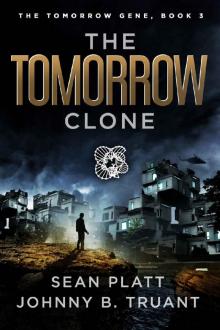 The Tomorrow Clone (The Tomorrow Gene Book 3)
The Tomorrow Clone (The Tomorrow Gene Book 3) Unicorn Western
Unicorn Western Namaste
Namaste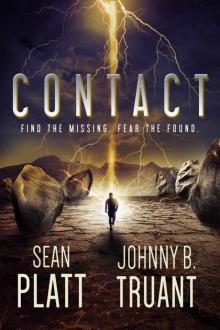 Alien Invasion (Book 2): Contact
Alien Invasion (Book 2): Contact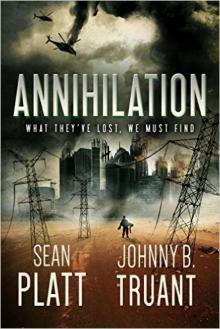 Alien Invasion (Book 4): Annihilation
Alien Invasion (Book 4): Annihilation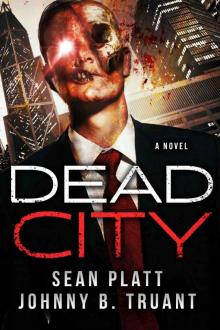 Dead City
Dead City The Eden Experiment
The Eden Experiment Unicorn Genesis (Unicorn Western)
Unicorn Genesis (Unicorn Western) The Beam: Season Two
The Beam: Season Two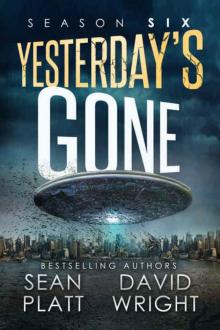 Yesterday's Gone: Season Six
Yesterday's Gone: Season Six Homecoming (Karma Police Book 6)
Homecoming (Karma Police Book 6)![[Alien Invasion 01.0] Invasion Read online](http://i1.bookreadfree.com/i1/03/30/alien_invasion_01_0_invasion_preview.jpg) [Alien Invasion 01.0] Invasion
[Alien Invasion 01.0] Invasion Z 2136 (Z 2134 Series Book 3)
Z 2136 (Z 2134 Series Book 3) Alien Invasion (Book 5): Judgment
Alien Invasion (Book 5): Judgment Threshold
Threshold Judgment
Judgment Jumper: Karma Police Book One
Jumper: Karma Police Book One Boricio Goes Camping (Dark Crossings)
Boricio Goes Camping (Dark Crossings) Extinction
Extinction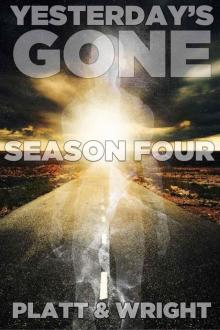 Yesterday's Gone (Season Four): Episodes 19-24
Yesterday's Gone (Season Four): Episodes 19-24![[No Justice 01.0] No Justice Read online](http://i1.bookreadfree.com/i2/04/09/no_justice_01_0_no_justice_preview.jpg) [No Justice 01.0] No Justice
[No Justice 01.0] No Justice The Beam: Season One
The Beam: Season One La Fleur de Blanc
La Fleur de Blanc The Collectors (Karma Police Book 3)
The Collectors (Karma Police Book 3)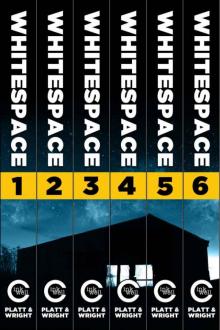 WhiteSpace: Season One (Episodes 1-6 of the sci-fi horror serial)
WhiteSpace: Season One (Episodes 1-6 of the sci-fi horror serial)